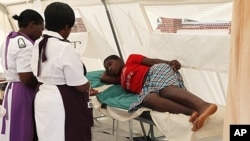In recent months, hundreds of Zimbabweans in the country's capital have contracted typhoid with as many as 50 new cases reported daily. But Harare residents say the government response to the outbreak is inadequate.
For years, people have complained about the deterioration in the city's water and sanitation system, which is old and in a severe state of disrepair. Precious Shumba, director of the Harare Residents' Trust, says that densely populated areas are especially bad off.
"Water pressure is slow most of the time, and the sewerage pipes are bursting frequently [so] that they are contaminating the water that people drink," said Shumba.
Briefing the media Tuesday, Health Minister Henry Madzorera acknowledged that disease outbreaks such as typhoid and cholera are a consequence of a significant decline in public health infrastructure.
"Water deprivation at individual and household levels lowers basic hygiene standards, because a critical amount of water per individual per day is required to ward off diarrheal diseases,"explained Madzorera.
Residents of densely populated areas often have to rely on wells for water, but city administrator Tendai Mahachi says the wells may now be closed.
"As a matter of fact we are in the process of trying to evaluate whether we should start closing some of the wells, so that I think that they depend solely on the water from city of Harare," said Mahachi.
Much of Zimbabwe's infrastructure is in a state of disrepair after years of economic and political turmoil, dating from 2000, when President Robert Mugabe's ZANU-PF party began seizing commercial farms owned by whites. The subsequent plunge in agricultural production severely hurt the economy, and infrastructure was allowed to deteriorate. The situation has improved only slightly since the inclusive government took power in 2009.
This week, the city closed open air food markets, saying that fish being sold in the markets have been contaminated by sewage leaking into the groundwater and rivers. The council said it was a temporary measure until the water supply is safe. But the Trust's Shumba says this is treating a symptom and not the cause.
"Closing down open air food markets is not a solution at all; they are addressing a symptom of poverty [and] social economic challenges facing communities," Shumba added.
Shumba says that the residents of Harare will continue to be at risk until the council repairs and upgrades the water and sanitation systems, which they are not doing.
"Our expectation was that as a local authority in terms of prioritization, water and sewerage reticulation was going to be a priority reflected in their 2012 city budget. Unfortunately their priorities are on salaries and administration, which does not reflect the kind of problems that the citizens are encountering," Shumba noted.
Last year, the central government gave the city $17 million to upgrade the infrastructure but Shumba says much of the money went to administration. Some have said it would take hundreds of millions of dollars to do the job adequately, but Shumba says that if properly managed, the job could be done with between $50 and $65 million.
Zimbabweans Worry About Rise in Typhoid Cases




